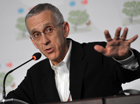The negotiating architecture that has governed the decades-long pursuit of an international climate
 agreement is outdated, said Todd Stern, the U.S. special envoy for climate change at the State Department and the nation’s lead climate negotiator. In remarks delivered at Yale University’s Law School on Tuesday, Stern reiterated the U.S. position that all nations — both rich ones and developing ones — must be brought together under one agreement that includes pledges to cut emissions. “This split between developed and developing countries in the climate convention is the singular fault line in these negotiations,” Stern said, “and has been from the beginning.” Under the recently expired Kyoto protocol, developing countries like China and India were exempted from committing to emissions cuts. Climate talks are scheduled to resume in Lima, Peru later this year, with a goal of achieving a new and fully global treaty at a meeting in Paris in 2015. That pact, Stern argued, ought to require all nations to submit emissions reduction targets, tailored as needed to national interests and abilities.
agreement is outdated, said Todd Stern, the U.S. special envoy for climate change at the State Department and the nation’s lead climate negotiator. In remarks delivered at Yale University’s Law School on Tuesday, Stern reiterated the U.S. position that all nations — both rich ones and developing ones — must be brought together under one agreement that includes pledges to cut emissions. “This split between developed and developing countries in the climate convention is the singular fault line in these negotiations,” Stern said, “and has been from the beginning.” Under the recently expired Kyoto protocol, developing countries like China and India were exempted from committing to emissions cuts. Climate talks are scheduled to resume in Lima, Peru later this year, with a goal of achieving a new and fully global treaty at a meeting in Paris in 2015. That pact, Stern argued, ought to require all nations to submit emissions reduction targets, tailored as needed to national interests and abilities.

Climate Envoy Todd Stern